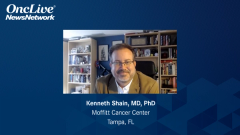
Melphalan flufenamide
Multiple myeloma expert Dr Kenneth Shain discusses mechanism of action of melphalan flufenamide and the advantage it might offer to fight cancer cells.
Kenneth Shain, MD, PhD: A newer therapy that’s been approved in the treatment of late relapse myeloma is a drug called melphalan flufenamide. It’s a new way of thinking about taking care of the disease. We’ve developed a lot of therapies that target myelobiology, in terms of proteasome inhibition, and we’ve done IMiDs, immunomodulatory imide drugs, in targeting that aspect of myelobiology. We have monoclonal antibodies, which target the myeloma cells specifically and then recruit other aspects of things. Melphalan flufenamide is a novel take on how we can target the myeloma smarter than we have in the past.
Melphalan flufenamide, an alkylating agent, is a more typical DNA-damaging agent that attacks cells by killing those that are dividing too quickly by alkylating and causing DNA damage. Melphalan flufenamide is a modified form of this in which the drug is smarter, so to speak, because it requires processing by these things called aminopeptidases, which are a higher expression in cancer cells and in myeloma cells. The drug is only metabolized and, therefore, active in the myeloma cells. The idea is that it’s a drug that will have more toxicity direct within the myeloma and less toxicity on a tumor microenvironment, as well as the person.
That’s the major way we think about it. It’s being cleaved and then activated, where then it takes on its alkylating activities within the context of the myeloma cell itself with greater specificity. That’s 1 important way we think about another way of making a superior therapy by targeting it better to the cancer cell itself and, in this case, a myeloma cell. Those are the things we want to think about when we talk about the new and novel ways in which melphalan flufenamide is an evolution of our therapy against myeloma cells.
Transcript edited for clarity.







































